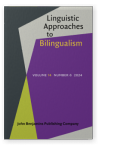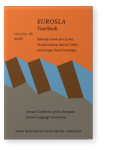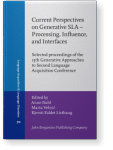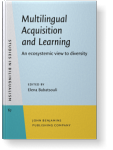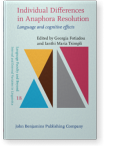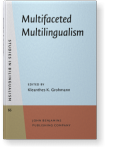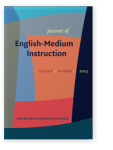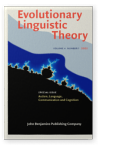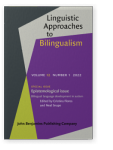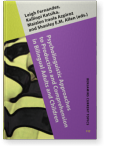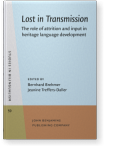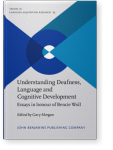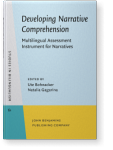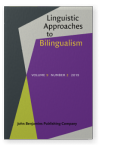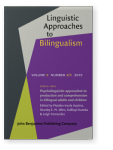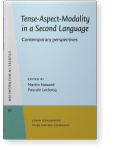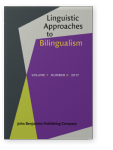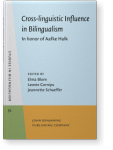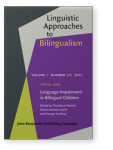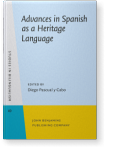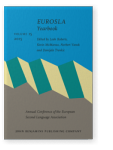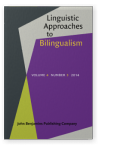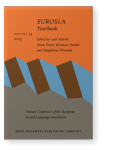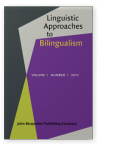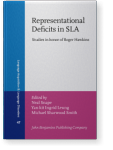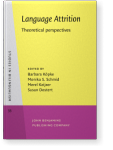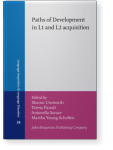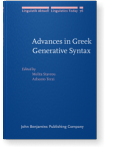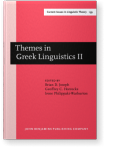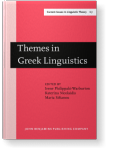Ianthi Maria Tsimpli
List of John Benjamins publications for which Ianthi Maria Tsimpli plays a role.
Journal
Yearbook
Book series
ISSN 0925-0123
Title
Individual Differences in Anaphora Resolution: Language and cognitive effects
Edited by Georgia Fotiadou and Ianthi Maria Tsimpli
[Language Faculty and Beyond, 18] 2023. vi, 246 pp.
Subjects Language acquisition | Multilingualism | Semantics | Syntax | Theoretical linguistics
2024 Chapter 8. Bilingualism matters: A study of children with autism spectrum disorder and developmental language disorder Multifaceted Multilingualism, Grohmann, Kleanthes K. (ed.), pp. 204–231 | Chapter
This study investigated bilingualism effects on language, executive functions and Theory of Mind (ToM) in children with Autism Spectrum Disorder (ASD), and with Developmental Language Disorder (DLD). The performance of these clinical groups was compared to that of children with typical… read more
2024 Chapter 15. Multilingualism, linguistic diversity, and English in India: Effects on underprivileged children’s linguistic and cognitive development Current Perspectives on Generative SLA - Processing, Influence, and Interfaces: Selected proceedings of the 16th Generative Approaches to Second Language Acquisition Conference, Velnić, Marta, Anne Dahl and Kjersti Faldet Listhaug (eds.), pp. 374–400 | Chapter
This chapter explores bi-/multilingualism in the Indian context, summarizing findings from the MultiLiLa project which addressed the persistent challenge of low learning outcomes in India. The research covered diverse geographical settings and employed a comprehensive methodology. We present… read more
2024 Chapter 4. Microstructural properties in the narrative retellings of young English learners in EMI schools in India: The role of L2 literacy, minority languages and English input in the classroom Multifaceted Multilingualism, Grohmann, Kleanthes K. (ed.), pp. 68–122 | Chapter
The present study investigates narrative microstructure in the English oral retellings of primary school children from disadvantaged backgrounds in India. For these children, the combination of rich linguistic diversity and English as the medium of instruction is a challenge since exposure to… read more
2023 How English-Medium Instruction affects language and learning outcomes of children in the Maldives Journal of English-Medium Instruction 2:1, pp. 1–26 | Article
Whilst the vast majority of the Maldivian population speak Dhivehi at home, English typically serves as the only medium of instruction (MoI) starting from primary school. Teachers have expressed their concerns regarding educational quality, as many children are taught in a language they do not… read more
2023 Individual Differences in Anaphora Resolution: An introduction Individual Differences in Anaphora Resolution: Language and cognitive effects, Fotiadou, Georgia and Ianthi Maria Tsimpli (eds.), pp. 1–20 | Chapter
2023 On the interaction of age, cognitive abilities, print exposure and pronoun type in pronoun resolution Individual Differences in Anaphora Resolution: Language and cognitive effects, Fotiadou, Georgia and Ianthi Maria Tsimpli (eds.), pp. 68–93 | Chapter
Our study examines the impact of age differences in the interpretation of null and overt subject pronouns in referentially ambiguous sentences, while investigating at the same time the extent to which ambiguous anaphora resolution is affected by cognitive and print exposure measures. Older… read more
2022 The language-communication divide: Evidence from bilingual children with atypical development Autism, Language, Communication and Cognition, Durrleman, Stephanie (ed.), pp. 5–51 | Article
Has language developed to serve as a system of communication or one of thought? While language is clearly an excellent tool for communication, the possible contribution of higher order cognitive processes other than language to communication may provide insights on how we think about language… read more
2022 On how linguistically-informed research can further address heterogeneity in bilingualism and autism Epistemological issue: Bilingual Language Development in Autism, Flores, Cristina and Neal Snape (eds.), pp. 82–86 | Commentary
2021 Bilingual reference production: A cognitive-computational account Psycholinguistic Approaches to Production and Comprehension in Bilingual Adults and Children, Fernandez, Leigh B., Kalliopi Katsika, Maialen Iraola Azpiroz and Shanley E.M. Allen (eds.), pp. 67–97 | Chapter
We investigate reference production in bilingual children. Based on Kibrik (2011), we analyze the production of referring expressions in discourse in terms of activation of a referent. We propose a novel approach, which calculates activation by taking into account different activation-lending… read more
2020 Heritage and non-heritage bilinguals: The role of biliteracy and bilingual education Lost in Transmission: The role of attrition and input in heritage language development, Brehmer, Bernhard and Jeanine Treffers-Daller (eds.), pp. 171–196 | Chapter
The present study explores the effects of literacy support in the languages of the bilingual child on the linguistic and cognitive skills of (non-)heritage speakers. 70 children speaking Albanian (L1) and Greek (L2) are divided into three groups according to whether they receive literacy support in… read more
2020 Chapter 6. Age of acquisition effects in language development Understanding Deafness, Language and Cognitive Development: Essays in honour of Bencie Woll, Morgan, Gary (ed.), pp. 93–113 | Chapter
The most accessible language for deaf children is generally a sign language, but few children have input in sign languages early in life. Late first-language acquisition of a sign language reveals age of acquisition effects that must be taken into consideration by linguistic theories of acquisition. read more
2020 Bilingualism effects in the narrative comprehension of children with Developmental Language Disorder and L2-Greek: Links with language, executive function and Theory of Mind Developing Narrative Comprehension: Multilingual Assessment Instrument for Narratives, Bohnacker, Ute and Natalia Gagarina (eds.), pp. 297–330 | Chapter
Narrative comprehension is a complex process that requires the ability to integrate language information from the speech signal with visual and contextual knowledge, while drawing also from social cognition and executive functions. Although many studies have examined narrative comprehension in… read more
2019 The development of gender assignment and agreement in English-Greek and German-Greek bilingual children Linguistic Approaches to Bilingualism 9:2, pp. 253–288 | Article
The aim of this experimental study is to examine the development of Greek gender in bilingual English-Greek and German-Greek children. Four gender production tasks were designed, two targeting gender assignment eliciting determiners and two targeting gender agreement eliciting predicate… read more
2019 Bilingual reference production: A cognitive-computational account Psycholinguistic approaches to production and comprehension in bilingual adults and children, Azpiroz, Maialen Iraola, Shanley E.M. Allen, Kalliopi Katsika and Leigh B. Fernandez (eds.), pp. 569–599 | Article
We investigate reference production in bilingual children. Based on Kibrik (2011), we analyze the production of referring expressions in discourse in terms of activation of a referent. We propose a novel approach, which calculates activation by taking into account different activation-lending… read more
2017 Issues in the acquisition of grammatical aspect in Greek-English bilingual children Tense-Aspect-Modality in a Second Language: Contemporary perspectives, Howard, Martin and Pascale Leclercq (eds.), pp. 75–103 | Article
The present study investigates the comprehension of perfective and imperfective aspect in Greek-English bilingual children. Previous work on L2 acquisition of aspect indicates that imperfective aspect appears later than perfective aspect in the marking of past events across various languages… read more
2017 Cross-linguistic influence meets language impairment: Determiners and object clitics in Russian-Greek bilingual children with typical development and with Specific Language Impairment Cross-linguistic Influence in Bilingualism: In honor of Aafke Hulk, Blom, Elma, Leonie Cornips and Jeannette Schaeffer (eds.), pp. 331–354 | Chapter
Our study investigates the use of articles and object clitics in the L2-Greek of child speakers of Russian with and without Specific Language Impairment. Effects of language impairment were examined in the narratives of children whose languages differ in the expression of definiteness: Russian… read more
2017 Object Clitic production in monolingual and bilingual children with Specific Language Impairment: A comparison between elicited production and narratives Language Impairment in Bilingual Children: State of the art 2017, Marinis, Theodoros, Sharon Armon-Lotem and George Pontikas (eds.), pp. 394–430 | Article
Pronominal clitics are sensitive to both morphosyntax and discourse. Problems in clitic use could therefore stem from morphosyntactic or discourse management problems in children with SLI. Previous studies focused on 3rd person clitic use identifying morphosyntactic problems. We compare 1st with… read more
2016 Formal linguistic approaches to heritage language acquisition: Bridges for pedagogically oriented research Advances in Spanish as a Heritage Language, Pascual y Cabo, Diego (ed.), pp. 13–26 | Article
The goal of this chapter is to lay out the central themes of heritage language acquisition research adopting a formal/theoretical linguistic perspective. Specifically, we aim to provide a detailed discussion of the nature of heritage language grammars. In doing so, we will address the debates on… read more
2015 Character reference in Greek-German bilingual children’s narratives EUROSLA Yearbook: Volume 15 (2015), Roberts, Leah, Kevin McManus, Norbert Vanek and Danijela Trenkic (eds.), pp. 1–40 | Article
This study investigates reference management of two groups of 8–12 year old Greek–German bilinguals, resident in Greece (Bilinguals_GR N = 38) and in Germany (Bilinguals_GE N = 39). We analyze the bilinguals’ retellings in each language and compare them with data from two monolingual control groups… read more
2014
Research on child bilingualism accounts for differences in the course and the outcomes of monolingual and different types of bilingual language acquisition primarily from two perspectives: age of onset of exposure to the language(s) and the role of the input (Genesee, Paradis, & Crago, 2004;… read more
2013 On the optionality in L2 pronominal production and interpretation: What (more) can VP-coordination structures tell us? EUROSLA Yearbook: Volume 13 (2013), Roberts, Leah, Anna Ewert, Miroslaw Pawlak and Magdalena Wrembel (eds.), pp. 22–46 | Article
This paper aims to contribute to the discussion pertaining to the source of optionality in second language (L2) pronominal interpretation. We examined pronominal use not only in L2 English adverbial – adjunct CP clauses (‘The student was upset because he had failed the test’), but also in English… read more
2009 Aspect and the Interpretation of Motion Verbs in L2 Greek Representational Deficits in SLA: Studies in honor of Roger Hawkins, Snape, Neal, Yan-kit Ingrid Leung and Michael Sharwood Smith (eds.), pp. 187–227 | Article
This study examines the role of aspect in L2 acquisition within the framework of the Interpretability Hypothesis (Tsimpli 2003; Hawkins and Hattori 2006). Aspect in Greek is a grammaticalized, interpretable feature affecting the argument structure and the telic/atelic interpretation of… read more
2007 First language attrition from a minimalist perspective: Interface vulnerability and processing effects Language Attrition: Theoretical perspectives, Köpke, Barbara, Monika S. Schmid, Merel Keijzer and Susan Dostert (eds.), pp. 83–98 | Article
The present paper deals with first language attrition under the influence of a second language. Two sets of data are presented: the first is offline data from a variety of tasks aiming to address the question of selective vulnerability of interfaces as opposed to the computational system underlying… read more
2006 The acquisition of voice and transitivity alternations in Greek as native and second language Paths of Development in L1 and L2 acquisition: In honor of Bonnie D. Schwartz, Unsworth, Sharon, Teresa Parodi, Antonella Sorace and Martha Young-Scholten (eds.), pp. 15–55 | Article
2005 Peripheral positions in early Greek Advances in Greek Generative Syntax: In honor of Dimitra Theophanopoulou-Kontou, Stavrou, Melita and Arhonto Terzi (eds.), pp. 179–216 | Article
1998 Individual and Functional Readings for Focus, Wh- and Negative Operators evidence from greek Themes in Greek Linguistics: Volume II, Joseph, Brian D., Geoffrey C. Horrocks and Irene Philippaki-Warburton (eds.), pp. 197–228 | Article
1994 On the interaction of case and definiteness in modern Greek Themes in Greek Linguistics: Papers from the First International Conference on Greek Linguistics, Reading, September 1993, Philippaki-Warburton, Irene, Katerina Nicolaidis and Maria Sifianou (eds.), pp. 69–76 | Article
